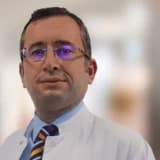Prognostic significance of hematogone presence after autologous stem cell transplantation in patients with multiple myeloma

Abstract
Background: Morphologically and immunophenotypically, the number of B-lymphocyte progenitor cells, so-called hematogones increases after chemotherapy and allogeneic stem cell transplantions. It is thought that hematogones can be used as a prognostic marker in these patients. It is aimed to determine the prognostic significance and factors affecting the development of hematogones, which can be seen after autologous stem cell transplantation in multiple myeloma (MM) patients.
Methods: This retrospective and single center study includes 80 patients who underwent autologous stem cell transplantation with the diagnosis of MM in our clinic between January 2013 and December 2019. The primary endpoint of the study was the relationship between the presence and rate of hematogone (HG) and progression free survival (PFS) and overall survival (OS). The secondary endpoint was to identify the factors affecting the development of HG.
Results: HG was detected in 61.2% of the patients. There was a moderate and positive linear correlation between the amount of stem cells given and HG ratio (r = 0.387, p = 0.000). PFS and OS were significantly shorter in the group with HG (p = 0.000 and p = 0.012).
Conclusions: HG positivity after autologous stem cell transplantation was found to be an independent prognostic marker for PFS and OS in patients with MM. There is a positive relationship between the amount of stem cells used during transplantation and the ratio of HG. As the amount of stem cells increases, the ratio of HG increases and when the ratio of HG increases, PFS and OS become shorter.
